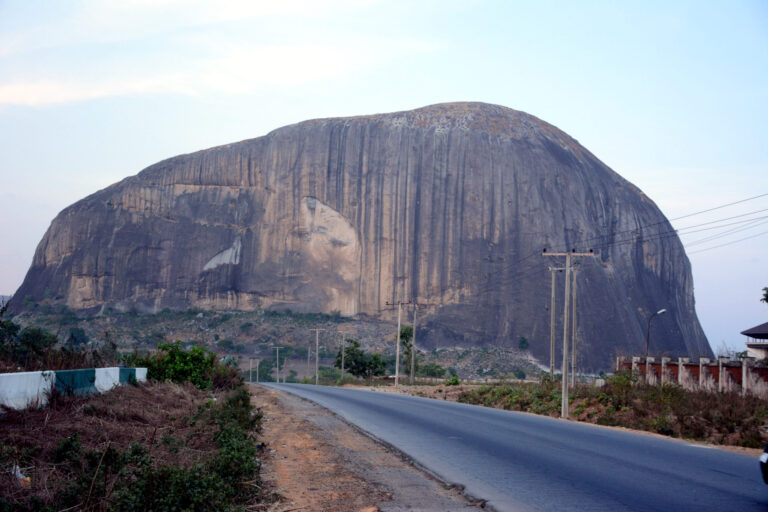Many people dread approaching the rock, fearing it harbors dark secrets. Some claim that escapees from ritualistic activities have come forward with spine-chilling testimonies – Aminu
The first time I truly beheld Zuma Rock as a national treasure of Nigeria was not in person, but on the N100 note. Its bold depiction on our currency symbolized its cultural and historical significance. Growing up, I had heard whispers of its mysteries—tales of spirits, rituals, and inexplicable events surrounding the towering monolith. As children, my siblings and I would accompany our parents to the farmlands behind the rock, but never alone. The fearful stories that circulated among the locals ensured that solitude near Zuma Rock was out of the question.
Despite these eerie narratives, I have never personally encountered any sinister events around the rock. Neither have I met an eyewitness with a verifiable account—only the haunting stories aired on the “Lean On Me” program by Tony Amole on Capital FM. Many people dread approaching the rock, fearing it harbors dark secrets. Some claim that escapees from ritualistic activities have come forward with spine-chilling testimonies. But for five years, while my family cultivated land around Zuma Rock, I saw nothing but its majestic presence—a silent guardian of the landscape, standing tall and proud.
The Grand Enigma of Zuma Rock
Zuma Rock is more than just a geological wonder; it is a sentinel at the border of Niger State and Abuja, standing at an awe-inspiring height of 725 meters (2,379 feet). Travelers along the Abuja-Kaduna highway are greeted by its imposing silhouette, and many claim to experience an unusual silence as they pass by, as if the rock commands reverence.

Legends tell of the Gbagyi people using Zuma Rock as a fortress, a defensive retreat during inter-tribal wars. More intriguingly, the rock’s surface bears natural contours that eerily resemble human facial features—a visible mouth, eyes, and nose. This phenomenon has led the native community to believe the rock is imbued with ancestral spirits, watching over them from beyond.
Even more mystifying is the phenomenon of fire appearing on the rock’s apex during the rainy season. While the locals attribute this to spiritual forces and divine wonders, scientists offer a different explanation. Dr. Kistso Ngargbu, a geologist, suggests that water saturation in rock crevices creates friction during movement, igniting flames—a natural yet dramatic occurrence.
Zuma Rock: A Portal to the Past
Historical accounts trace the discovery of Zuma Rock back to the 15th century when the Zuba people, guided by a soothsayer, settled around it. They named it “Zumwa,” meaning “the place of catching guinea fowls,” due to the abundance of the birds in the surrounding forest. Over time, the settlers recognized the rock’s spiritual significance and began offering sacrifices to appease its supposed deities. The Gbagyi people, too, considered it a passage to the afterlife, believing that spirits of the deceased journeyed to Zuma Rock.
Another fascinating myth claims that the rock sits atop a vast underground reservoir. If the rock were ever displaced, an uncontrollable flood would engulf large portions of land, altering the landscape permanently.

Experiencing Zuma Rock Firsthand
After years of listening to these stories, I decided to embark on my own journey to Zuma Rock. The same behemoth I had passed countless times as a child now stood before me, unchanged but more awe-inspiring than ever. Hiking the foothills was both exhilarating and humbling, and the views were nothing short of breathtaking.
Tourists and travelers alike share my sentiment. Reviews on TripAdvisor echo the wonder of Zuma Rock. One visitor, Marshal, described it as “a wowing experience.” Another traveler, Assurance Life, wrote, “Awesome natural monument.” Iguda, a geographer and frequent passerby, lamented the lack of development around the rock, advocating for its transformation into a world-class tourist and educational site.
Despite its rich history and tourism potential, Zuma Rock remains underdeveloped. Unlike global counterparts such as Australia’s Uluru Rock, which thrives as a major tourist attraction, Zuma Rock lacks recreational facilities, guided tours, and structured visitor experiences. A hotel project initiated near the rock was mysteriously abandoned, fueling local legends that supernatural forces interfered with its completion.
Yet, Zuma Rock remains an unyielding spectacle—an icon of Nigeria’s natural beauty and cultural heritage. Whether you are a traveler seeking adventure, a historian unearthing legends, or a scientist demystifying natural wonders, Zuma Rock offers something profound.
Next time you find yourself on the Abuja-Kaduna highway, pause for a moment. Gaze at this magnificent rock and feel the weight of centuries of history, myth, and wonder. And perhaps, if you listen closely, you might hear the whispers of its ancient guardians calling you to uncover its secrets.

This story first appears on GruvCity 2021.
